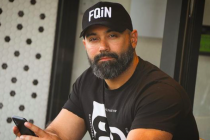A message released by North Cyprus’ ambassador to London Oya Tuncalı for the annual 20 July commemoration states it was the “communal solidarity” of Turkish Cypriots, which helped them to survive the “very difficult times” between 1963 and 1974.
The years refer to the period known as the Cyprus Conflict, which first broke out in December 1963 when Greek Cypriots launched a brutal coup to seize control of the island. The conflict concluded in the summer of 1974 when Turkey militarily intervened in response to a second coup by Greece-backed forces that threatened the very existence of Turkish Cypriots.
Nicos Sampson, the leader of the Greece-backed forces, had deposed Greek Cypriot President Makarios on 15 July, and announced union with Greece (‘Enosis’). He also infamously threatened to annihilate all Turkish Cypriots.
Five days later, Turkey intervened unilaterally in line with her responsibilities as a Guarantor Power. Some 30 days after the landing of Turkish troops, the United Nations brokered a ceasefire, which has held ever since.
Both communities experienced trauma from the heavy losses they bore through the conflict. A third of Greek Cypriots were displaced after the 1974 War and some five thousand died in combat fighting initially each other (pro Makarios vs pro Sampson/Greece), and then the Turks. Some 1,500 Greek Cypriots are still missing, their fate unknown.
Often overlooked by media and political commentators, Turkish Cypriots had been under siege for over a decade. By 1974, half of the community had been forced out of their homes, some becoming refugees multiple times as 103 Turkish villages were destroyed by Greek Cypriots, forcing Turkish Cypriot to live in enclaves and makeshift camps that amounted to 3% of the island’s territory. One in 50 Turkish Cypriots were killed during the 10 year conflict, and just under 500 are still missing.
Not surprisingly, Turkish troops landing in Cyprus in July were heralded as saviours by the Turkish Cypriot community, although it was too late to save some.
Map of ethnic settlement in Cyprus in 1973, showing the tiny enclaves Turkish Cypriots were forced to live in

Mass graves of women, children and the elderly were found at Muratağa / Maratha, Sandallar / Santalaris, Atlılar / Aloda, described by the UN as “crimes against humanity”. Another mass grave was found of 84 Turkish Cypriot men from Tashkent/Tochni, with further atrocities reported in Limassol.
There were also revenge killings of Greek Cypriots in Sysklipos, Prastio and Eptakomi. It was for this reason the Turkish army felt obliged to create two ethnic zones on the island, to ensure the safety of both communities.
In her statement, Ambassador Tuncalı refers to Turkey’s military intervention in July 1974 as “an important milestone in our great history” and that “20 July 1974 marks the safeguarding of our right to life and property, as well as the day we won our freedom”.
Ambassador Oya Tuncalı’s full ‘20 July’ message:
On the occasion of the 46th anniversary of the 20 July 1974 Peace Operation following the Greek-Greek Cypriot coup of 15 July 1974, where the Republic of Turkey used its right to intervene deriving from international treaties, I would like to sincerely wish all our citizens living in the United Kingdom a happy Peace and Freedom Day.
Between the years of 1963 and 1974, the Turkish Cypriot People endured very difficult times in their struggle to maintain their existence. It is thanks to their communal solidarity and union that they have succeeded with pride in maintaining their existence.
As an important milestone in our great history, 20 July 1974 marks the safeguarding of our right to life and property, as well as the day we won our freedom.
The Turkish Cypriot People have always felt the eternal support of the Anatolian people and are well aware of the significance of the unwavering ties between our country and the Republic of Turkey.
I would like to express my deep appreciation and respect towards the heroic Turkish Armed Forces which carried out the 20 July 1974 Peace Operation, our brave fighters who resisted with all their strength the efforts to annihilate our people until that date, and commemorate our martyrs who sacrificed their lives for our freedom.
With the pride and joy of celebrating our Peace and Freedom Day, I offer you all my best wishes and respect.




